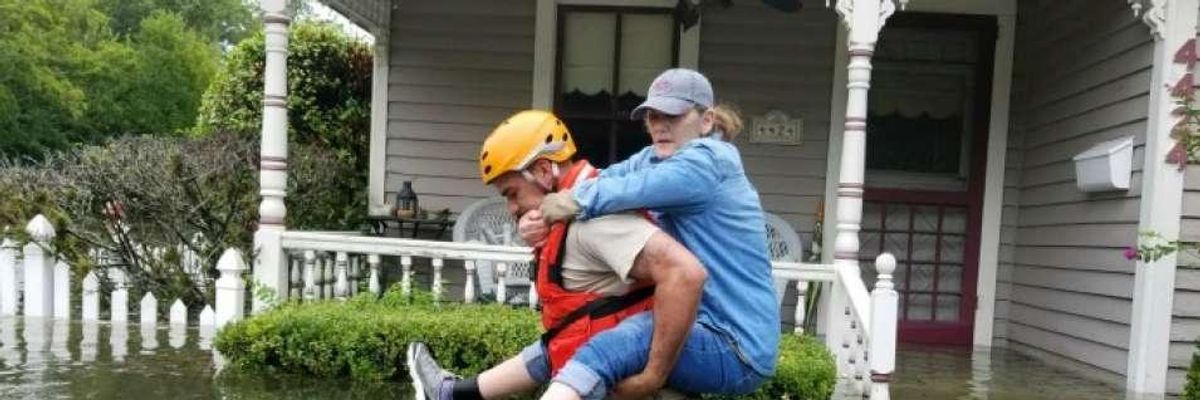
Texas National Guard soldiers conduct rescue operations in flooded areas around Houston, Texas on August 27, 2017. (Photo: 1Lt. Zachary West, 100th MPAD)
Trump Disbands Panel That Helped Cities Respond to Climate Threat
The president shutters group that, according to its chairman, was "one of the last federal bodies that openly talked about climate change in public"
In the Trump administration's latest attempt to quash any efforts by the federal government to raise awareness or mitigate the effects of climate change, a community resilience panel announced Monday that the president had terminated the two-year-old group.
Chairman Jesse Keenan, a Harvard University professor, told the other members of the Community Resilience Panel for Buildings and Infrastructure Systems on Monday that there would be no further meetings and the panel would dissolve, per President Donald Trump's orders.
"This was the federal government's primary external engagement for resilience in the built environment," Keenan told Bloomberg News.
"It was one of the last federal bodies that openly talked about climate change in public," he added. "I can say that we tried our best and we never self-censored!"
The panel was created in 2015 by former President Barack Obama in the aftermath of Hurricane Sandy, and had more than 350 volunteer members. Its mission to guide municipal governments and local groups to improve buildings, communications, energy systems, and transportation in response to climate threats made the panel especially vulnerable under the Trump administration.
Keenan told E&E News that the panel's abilitiy to collaborate resilience efforts across local, state, and the federal government as well as the private sector were especially notable, and described the group's key activities:
We identified gaps in codes and standards, we proposed streamlined communications channels, we vetted best practices in design standards, we created guides for operators of infrastructure facilities, etc. ...
It was a very diffuse effort by virtue of the diversity of infrastructure sectors that we covered, but we built a meaningful entity that served as a direct avenue of engagement with the federal government.
The panel was sponsored by the Department of Commerce's National Institute of Standards and Technology, and co-sponsored by the Department of Housing and Urban Development's Office of Economic Resilience, the Commerce Department's National Oceanic and Atmospheric Administration (NOAA), the Environmental Protection Agency (EPA), National Academies of Sciences, Engineering and Medicine, and the Department of Homeland Security's Federal Emergency Management Agency (FEMA) as well as its Office of Infrastructure Protection.
The group's members were scheduled to meet again in the spring of 2018.
An Urgent Message From Our Co-Founder
Dear Common Dreams reader, The U.S. is on a fast track to authoritarianism like nothing I've ever seen. Meanwhile, corporate news outlets are utterly capitulating to Trump, twisting their coverage to avoid drawing his ire while lining up to stuff cash in his pockets. That's why I believe that Common Dreams is doing the best and most consequential reporting that we've ever done. Our small but mighty team is a progressive reporting powerhouse, covering the news every day that the corporate media never will. Our mission has always been simple: To inform. To inspire. And to ignite change for the common good. Now here's the key piece that I want all our readers to understand: None of this would be possible without your financial support. That's not just some fundraising cliche. It's the absolute and literal truth. We don't accept corporate advertising and never will. We don't have a paywall because we don't think people should be blocked from critical news based on their ability to pay. Everything we do is funded by the donations of readers like you. Will you donate now to help power the nonprofit, independent reporting of Common Dreams? Thank you for being a vital member of our community. Together, we can keep independent journalism alive when it’s needed most. - Craig Brown, Co-founder |
In the Trump administration's latest attempt to quash any efforts by the federal government to raise awareness or mitigate the effects of climate change, a community resilience panel announced Monday that the president had terminated the two-year-old group.
Chairman Jesse Keenan, a Harvard University professor, told the other members of the Community Resilience Panel for Buildings and Infrastructure Systems on Monday that there would be no further meetings and the panel would dissolve, per President Donald Trump's orders.
"This was the federal government's primary external engagement for resilience in the built environment," Keenan told Bloomberg News.
"It was one of the last federal bodies that openly talked about climate change in public," he added. "I can say that we tried our best and we never self-censored!"
The panel was created in 2015 by former President Barack Obama in the aftermath of Hurricane Sandy, and had more than 350 volunteer members. Its mission to guide municipal governments and local groups to improve buildings, communications, energy systems, and transportation in response to climate threats made the panel especially vulnerable under the Trump administration.
Keenan told E&E News that the panel's abilitiy to collaborate resilience efforts across local, state, and the federal government as well as the private sector were especially notable, and described the group's key activities:
We identified gaps in codes and standards, we proposed streamlined communications channels, we vetted best practices in design standards, we created guides for operators of infrastructure facilities, etc. ...
It was a very diffuse effort by virtue of the diversity of infrastructure sectors that we covered, but we built a meaningful entity that served as a direct avenue of engagement with the federal government.
The panel was sponsored by the Department of Commerce's National Institute of Standards and Technology, and co-sponsored by the Department of Housing and Urban Development's Office of Economic Resilience, the Commerce Department's National Oceanic and Atmospheric Administration (NOAA), the Environmental Protection Agency (EPA), National Academies of Sciences, Engineering and Medicine, and the Department of Homeland Security's Federal Emergency Management Agency (FEMA) as well as its Office of Infrastructure Protection.
The group's members were scheduled to meet again in the spring of 2018.
In the Trump administration's latest attempt to quash any efforts by the federal government to raise awareness or mitigate the effects of climate change, a community resilience panel announced Monday that the president had terminated the two-year-old group.
Chairman Jesse Keenan, a Harvard University professor, told the other members of the Community Resilience Panel for Buildings and Infrastructure Systems on Monday that there would be no further meetings and the panel would dissolve, per President Donald Trump's orders.
"This was the federal government's primary external engagement for resilience in the built environment," Keenan told Bloomberg News.
"It was one of the last federal bodies that openly talked about climate change in public," he added. "I can say that we tried our best and we never self-censored!"
The panel was created in 2015 by former President Barack Obama in the aftermath of Hurricane Sandy, and had more than 350 volunteer members. Its mission to guide municipal governments and local groups to improve buildings, communications, energy systems, and transportation in response to climate threats made the panel especially vulnerable under the Trump administration.
Keenan told E&E News that the panel's abilitiy to collaborate resilience efforts across local, state, and the federal government as well as the private sector were especially notable, and described the group's key activities:
We identified gaps in codes and standards, we proposed streamlined communications channels, we vetted best practices in design standards, we created guides for operators of infrastructure facilities, etc. ...
It was a very diffuse effort by virtue of the diversity of infrastructure sectors that we covered, but we built a meaningful entity that served as a direct avenue of engagement with the federal government.
The panel was sponsored by the Department of Commerce's National Institute of Standards and Technology, and co-sponsored by the Department of Housing and Urban Development's Office of Economic Resilience, the Commerce Department's National Oceanic and Atmospheric Administration (NOAA), the Environmental Protection Agency (EPA), National Academies of Sciences, Engineering and Medicine, and the Department of Homeland Security's Federal Emergency Management Agency (FEMA) as well as its Office of Infrastructure Protection.
The group's members were scheduled to meet again in the spring of 2018.

